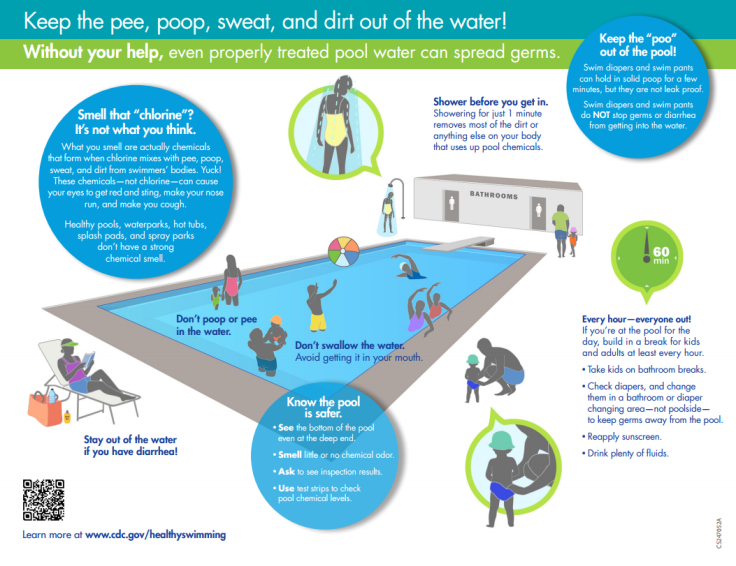Stop Peeing And Pooping In The Pools, Please: A Summer Reminder Of What Not To Do

The Internet is full of dark and terrifying things, but nothing tops the dread that occurs when you see a "You Won't Believe What's In Your ___" headline. Chances are several meals will be ruined or your favorite activity will be quickly abandoned. That's why you should be terrified about the latest news from the Centers for Disease Control and Prevention regarding "red eyes" and pools. Your irritated eyes are not caused by chlorine, but urine. Yeah, forget about swimming this summer.
The CDC decided to dispel some myths, which is never a great idea because the truth is usually worse than whatever fiction we've conjured up. The government agency knows a good topical story when it sees one, so it broke down pool health and safety tips that are perfect now that the hot weather has arrived.
What's grabbed all the headlines is the answer the agency gives to the myth of "Swimmer’s eyes turn red when there is too much chlorine in the pool." That myth was busted in the worst way possible. "Swimmers’ eyes redden from irritants – known as chloramines – produced when urine and sweat in the pool combine chemically with chlorine pool disinfectant," reads the statement. As an expert succinctly puts it, "someone might have peed in the pool."
It's unpleasant to think about and while you may have control over your pool in the backyard, there's no hope for a public pool. Odds are someone will pee in the water and next time you rub your eyes after a swim, you'll be reminded that maybe the water was a little too warm. You might also remember that one story or headline about a dye or way to tell if there is urine is in the pool. That could solve all of these problems, right?
Turns out that there is no dye that will help you. The CDC also dispelled that myth and said people should rely on the "honor system" regarding pool cleanliness. Your only hope is to take a lot of showers and hope other people follow your lead. There's further information regarding recreational water illnesses (RWIs) and how to avoid getting sick. "RWIs can be a wide variety of infections, including gastrointestinal, skin, ear, respiratory, eye, neurologic, and wound infections," the CDC said in a statement.

Chlorine and other chemicals used to treat pools are no match for the germs from urine, fecal matter or dirt. "These germs—sometimes millions at a time — can spread when someone who is sick has diarrhea in the water. Other people can get sick if they swallow the germy water — even just a mouthful." There was CDC report from 2013 that found poop in 58 percent of public pool samples.
Happy swimming!
© Copyright IBTimes 2024. All rights reserved.











